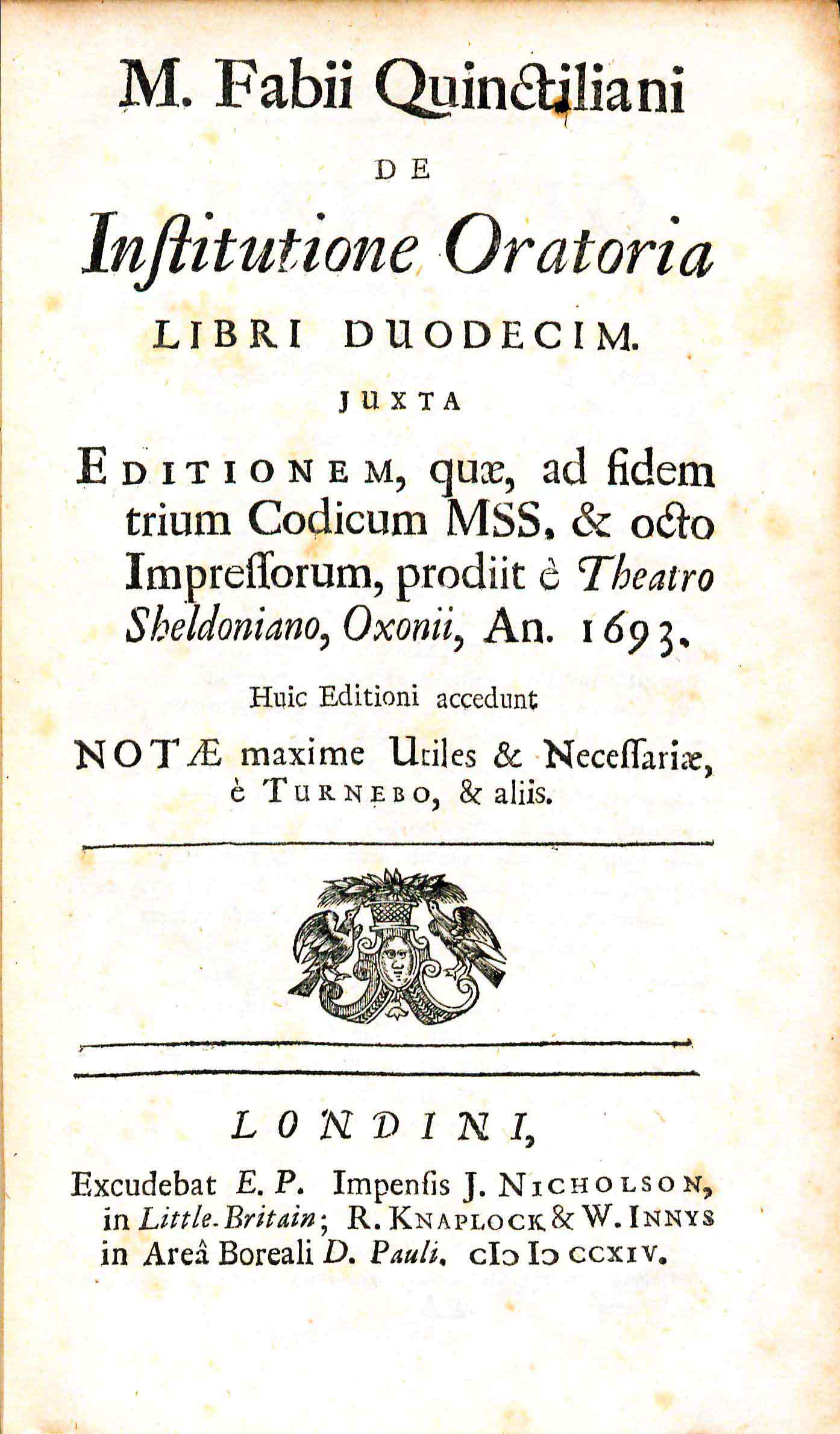M. Fabii Quinctiliani De Institutione Oratoria Libri Duodecim
by Quintilian
| De Institutione Oratoria | |
|
Title page from De Institutione Oratoria, George Wythe Collection, Wolf Law Library, College of William & Mary. | |
| Author | Quintilian |
| Published | Londoni: Excudebat E.P. ; Impensis J. Nicholson |
| Date | 1714 |
| Language | Latin |
| Pages | 721 |
| Desc. | 8vo (20 cm.) |
| Location | Shelf L-2 |
Marcus Fabius Quintilianus was a famous Roman advocator and orator.[1] He was born c. 35 CE at Calagurris in Spain, but his death date remains a mystery.[2] Quintilian possibly received all his education in Rome,[3] where he became close with the orator Domitius Afer.[4]
Quintilian wrote and published his one surviving work, Institutione Oratoria, in twelve books, prior to 96 CE.[5] It describes the life and training of an orator from birth until maturity.[6] Book 1 covers the importance of language as a foundation in early education, including the influence of nurses, parents, and slaves, as well as the superiority of schools over home education. Book 2 discusses the entrance of a boy into rhetoric school, the qualities of a good instructor, and guidelines for students working together. Books 3-7 discuss technicalities of oration in court speeches. Books 8-11 illuminate Quintilian’s views on oratory style and delivery. Perhaps most interesting is Book 10, where Quintilian gives his uncensored views of famous Greek and Latin writers. Book 12 sums up the discussion of an ideal orator by elucidating the personal and moral characteristics which make a vir bonus dicendi peritus, ‘a good man who knows how to speak’ (Quintilian quoting Cato the Elder).[7] Quintilian insisted on eloquence as a moral force, but was most concerned with good content to help shape sensible men.[8]
Evidence for Inclusion in Wythe's Library
Listed in the Jefferson Inventory of Wythe's Library as "Quinctilianus de instutitione Oratoriâ. 4to." and given by Thomas Jefferson to his grandson Thomas Jefferson Randolph. The precise edition owned by Wythe is unknown. George Wythe's Library[9] on LibraryThing suggests the 1693 edition published at Oxford, noting "This is the only quarto edition in ESTC [The English Short Title Catalog]." The Brown Bibliography[10] lists the London edition published in 1714 based on a copy at the University of Virginia which reportedly bears the inscription "Thomas J. Randolph, July 18th, 1826." The book has been rebound, making the signature no longer visible, however, Brown notes the size as quarto. The English Short Title Catalog describes the 1714 edition as an octavo. Nevertheless, the Wolf Law Library followed Brown's suggestion and purchased the London edition.
Description of the Wolf Law Library's copy
Bound in contemporary leather. Front and back boards feature decorative tooling.
Images of the library's copy of this book are available on Flickr. View the record for this book in William & Mary's online catalog.
See also
References
- ↑ John Roberts, ed., "Quintilian" in Oxford Dictionary of the Classical World (Oxford: Oxford University Press, 2007).
- ↑ M.C. Howatson, ed., "Quinti'lian" in The Oxford Companion to Classical Literature (Oxford: Oxford University Press, 2011).
- ↑ Ibid.
- ↑ Roberts, "Quintilian."
- ↑ Ibid.
- ↑ Howatson, "Quinti'lian."
- ↑ Ibid.
- ↑ Roberts, "Quintilian."
- ↑ LibraryThing, s.v. "Member: George Wythe" accessed on February 26,2014.
- ↑ Bennie Brown, "The Library of George Wythe of Williamsburg and Richmond," (unpublished manuscript, May, 2012) Microsoft Word file. Earlier edition available at: https://digitalarchive.wm.edu/handle/10288/13433.
